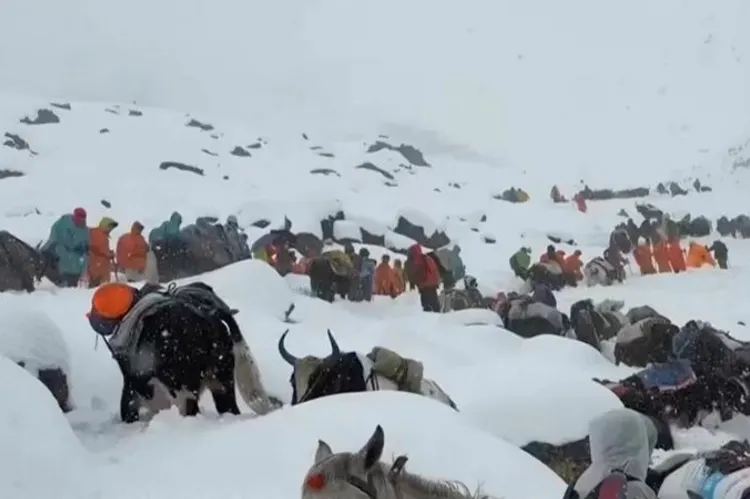What began as a hiking trip with friends on the breathtaking slopes of the Tibetan side of Mount Everest turned into a frightening ordeal for 30-year-old Feng Holiday, after a rare October blizzard left her and hundreds of hikers stranded in treacherous conditions. Feng and her group had set off from Youpa Village, in Tibet’s Shigatze prefecture, for their trek through the scenic Gama Valley on the eastern side of Mount Everest on October 1st. However, three days into their ambitious journey, a sudden and severe blizzard descended upon the region, dramatically altering their experience. The storm, characterized by unusually high snowfall, quickly overwhelmed the group, leading to the collapse of tents and the obstruction of trails. On Saturday evening, the situation escalated as hundreds of trekters were forced to evacuate following the perilous conditions. Feng and her companions found themselves stranded at an altitude of approximately 16,400 feet (5000 metres), grappling with the immediate threat of hypothermia and the overwhelming weight of the unexpected storm. Currently, around 350 trekters have been safely evacuated to the small township of Qudang, while over 200 others remain contactable and are awaiting assistance from the relevant authorities, as reported by the latest updates from Chinese state media CCTV on Monday morning.
Recognizing the gravity of the situation, support teams, including Tibetan authorities, are diligently working to assist the stranded hikers, ensuring that supplies are sufficient and personnel remain safe. Communication has been limited, a factor attributed to the sensitive nature of the region, which is an autonomous region of China governed by the Chinese Communist Party. Attempts to reach the Dingri County Fire Department, the Dingri County Blue Sky Rescue Team, and the county government via CNN proved unsuccessful, highlighting the challenges in coordinating a response.
Digging snow with cooking pots – A resourceful response. Feng, an avid hiker with a passion for exploration, initially wasn't overly concerned when the first snow began, believing that their group was adequately equipped for the conditions. However, as the storm intensified, characterized by thunder and lightning rattling the mountain range, her apprehension grew. By midnight, the snowfall had become torrential, and the condensation within her sleeping bag created a damp and uncomfortable environment. Faced with this worsening situation, Feng took decisive action, venturing out into the blizzard to shovel snow, only to discover that her teammates were similarly buried beneath the accumulating drifts. The group collectively realized they needed to work together, and, crucially, they lacked proper tools. Using their cooking pots as makeshift shovel’s, they began the arduous task of digging themselves free, a testament to their resilience and resourcefulness in the face of adversity. The effort was physically demanding, compounded by the extreme cold and the constant threat of further snowfall. The collective digging demonstrated a crucial element of survival – teamwork and utilizing available resources, even in the most challenging circumstances. More than 3 feet (95 cm) of snow fell at the summit of Mount Everest on Saturday, according to estimates from some snow reports – nearly three times the average weekly snowfall for this time of year.
October is a busy season for hiking on Everest, when skies tend to clear after the monsoon season. This week also coincides with China’s Golden Week holiday, a period of significant travel and tourism within the country. "The weather this year is not normal. The guide said he had never encountered such weather in October. And it happened all too suddenly," Chen Geshuang, another trekker who was evacuated to Qudang told Reuters news agency. "It was so wet and cold in the mountains, and hypothermia was a real risk." Videos posted to Chinese social media platform Xiaohongshu showed hikers shovel ing snow off buried tents in blustery whiteout conditions.
After a "scary" night, on Sunday morning, Feng and her friends began hiking down the mountain on their own, ditching their tent and gear for lighter packs, prioritizing speed and safety. They reached the foot of the mountain around 6:30 p.m. local time, where government officials and locals awaited them, as Feng described. The heavy snowfall follows a week of extreme weather across the Himalayan region. Floods and landslides triggered by severe rain in Nepal and around Darjeeling in northeast India killed more than 70 people, Reuters reported. A South Korean trekker died after hiking the 21,246 feet (6,476 meters) Mera Peak in Nepal Saturday, Reuters reported.
"We have to respect nature," Feng shared one key lesson: reflecting on her ordeal on Everest. CNN’s Joyce Jiang and Briana Waxman contributed reporting.
























